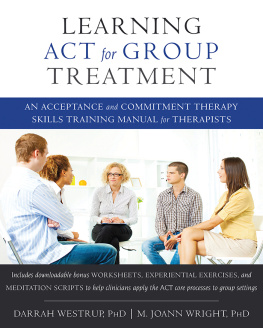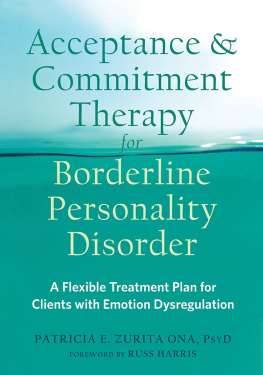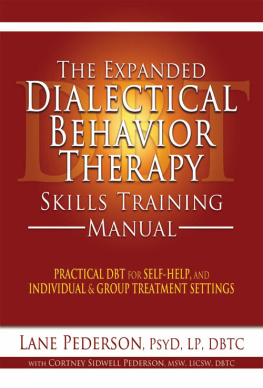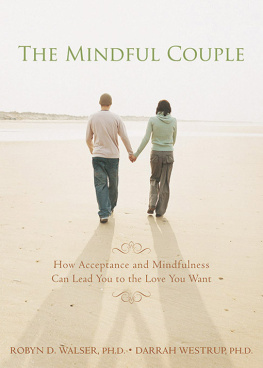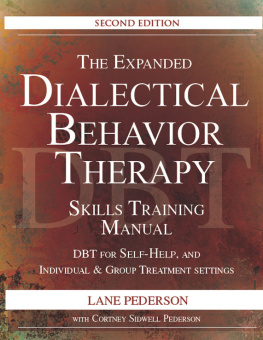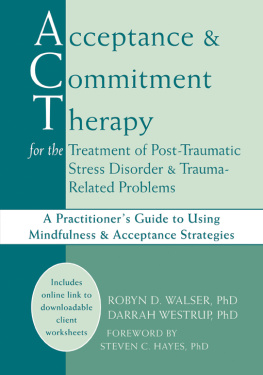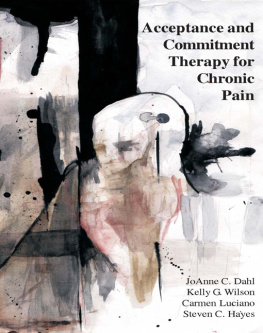Darrah Westrup - Learning ACT for Group Treatment
Here you can read online Darrah Westrup - Learning ACT for Group Treatment full text of the book (entire story) in english for free. Download pdf and epub, get meaning, cover and reviews about this ebook. City: Oakland, CA, year: 2017, publisher: Context Press, genre: Science. Description of the work, (preface) as well as reviews are available. Best literature library LitArk.com created for fans of good reading and offers a wide selection of genres:
Romance novel
Science fiction
Adventure
Detective
Science
History
Home and family
Prose
Art
Politics
Computer
Non-fiction
Religion
Business
Children
Humor
Choose a favorite category and find really read worthwhile books. Enjoy immersion in the world of imagination, feel the emotions of the characters or learn something new for yourself, make an fascinating discovery.
- Book:Learning ACT for Group Treatment
- Author:
- Publisher:Context Press
- Genre:
- Year:2017
- City:Oakland, CA
- Rating:3 / 5
- Favourites:Add to favourites
- Your mark:
- 60
- 1
- 2
- 3
- 4
- 5
Learning ACT for Group Treatment: summary, description and annotation
We offer to read an annotation, description, summary or preface (depends on what the author of the book "Learning ACT for Group Treatment" wrote himself). If you haven't found the necessary information about the book — write in the comments, we will try to find it.
Learning ACT for Group Treatment — read online for free the complete book (whole text) full work
Below is the text of the book, divided by pages. System saving the place of the last page read, allows you to conveniently read the book "Learning ACT for Group Treatment" online for free, without having to search again every time where you left off. Put a bookmark, and you can go to the page where you finished reading at any time.
Font size:
Interval:
Bookmark:

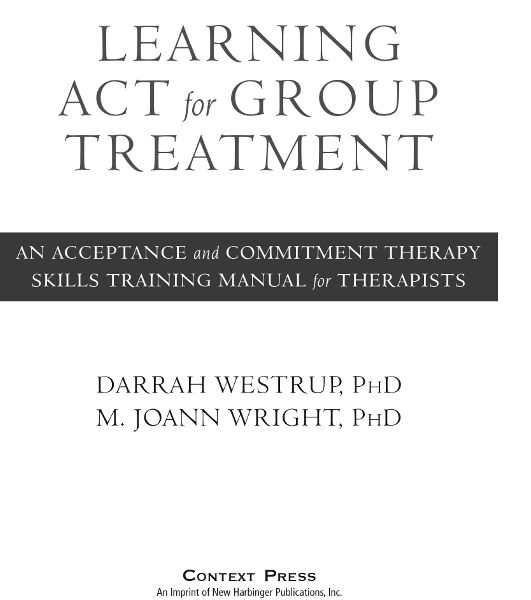
Publishers Note
This publication is designed to provide accurate and authoritative information in regard to the subject matter covered. It is sold with the understanding that the publisher is not engaged in rendering psychological, financial, legal, or other professional services. If expert assistance or counseling is needed, the services of a competent professional should be sought.
Distributed in Canada by Raincoast Books
Copyright 2017 by M. Joann Wright and Darrah Westrup
Context Press
An imprint of New Harbinger Publications, Inc.
5674 Shattuck Avenue
Oakland, CA 94609
www.newharbinger.com
Eye Contact Exercise adapted from Acceptance and Commitment Therapy, First Edition by Steven C. Hayes, Kirk D. Strosahl, and Kelly G. Wilson, copyright 1999 by The Guilford Press. Adapted by Permission of The Guilford Press.
Passengers on the Bus and Take Your Mind for a Walk adapted from Acceptance and Commitment Therapy, Second Edition by Steven C. Hayes, Kirk D. Strosahl, and Kelly G. Wilson, copyright 2011 by The Guilford Press. Adapted by Permission of The Guilford Press.
Mindful Action Plan by Daniel J. Moran 2015. Used by permission of the author.
Cover design by Amy Shoup; Acquired by Catharine Meyers; Edited by Rona Bernstein; Indexed by James Minkin
All Rights Reserved
Library of Congress Cataloging-in-Publication Data on file
19 18 17
10 9 8 7 6 5 4 3 2 1 First Printing
Finally! The scientific literature on acceptance and commitment therapy (ACT) is heavily based on group intervention methods, but through nearly three decades of such studies, no book has been available to walk clinicians through the myriad choice points, barriers, and opportunities presented by ACT in groups. No more. This wonderful and readable volume walks through every relevant area and issue in a way that is wise, evidence-based, and clear. How can you organize an open membership ACT group? What if a group member just wants to tell stories? In area after area and issue after issue, Westrup and Wright have skillfully done the heavy lifting for you. If youre doing ACT in groups, you now have a much easier job: buy the book, read it, and use it.
StevenC. Hayes, PhD, Foundation Professor of Psychology at the University of Nevada, and cofounder of ACT
This long-awaited book finally provides therapists with the guidance they needed to do ACT in groups. Darrah Westrup and Joann Wright have turned their scientific expertise and clinical wisdom into a wonderfully written text that covers all the key aspects of the psychological flexibility model while addressing the typical pitfalls and advantages of doing ACT in this context. This is an essential read for all therapists doing ACT in groups!
MatthieuVillatte, PhD, coauthor of MasteringtheClinicalConversation
Lifes too short to beat around the bush, so Im going to be blunt: if you do ACT with groups, or if you wish to start doing so, you need this book. Chockablock full of wisdom and experience from experts in the field, its not just an optional extra; its an absolute essential. If you want to help groups of people to discover ACT, and leave them glowing with a sense of vitality and fulfilment, then be smart about it: allow Westrup and Wright to light the way for you.
RussHarris, author of TheHappinessTrap and ACTMadeSimple
Westrup and Wright have masterfully woven the ACT approach into the group therapy milieu. Contextual behavioral science, the foundation of ACT, suggests the human condition evolved through the blending of two levels of selection: the group and the individual. The ACT community has long endeavored to address the human condition in a way that reduces suffering and improves quality of living by using applied behavioral science to help at the individual level. Thankfully Westrup and Wright are contributing to the applied literature with an eye on utilizing group therapy to direct the therapeutic process in important, valuable directions. LearningACTforGroupTreatment highlights advanced ACT topics in a manner accessible for a novice. This pioneering book offers practical exercises for immediate application, and gives incisive examples of how to use them in an ACT-consistent manner. Most importantly, Westrup and Wright created a flexible framework to create unique, impactful group therapy interactions. Highly recommended, even if you are not a group therapist.
D.J. Moran, PhD, BCBA-D, founder of Pickslyde Consulting and the MidAmerican Psychological Institute
Its here! And its just whats needed for the therapist looking to do ACT in a group format. For those who have been waiting and asking for a thoughtful and effective guideincluding material ranging from brief basics on ACT to utilizing core processes in a powerful and dynamic way in group therapy to supplementary content designed to support its implementationthis is the book for you. Darrah Westrup and Joann Wright have written this manual in a user-friendly fashion. The book is comprehensive in nature, while also maintaining a compassionate clinical voicefelt in both the example dialogue and the overall approach. ACT delivered in the context of group therapy is not only robust, but also helps clients to connect with others in the very human experience of suffering. Westrup and Wright bring these qualities to life. A must-read for those doing or wanting to do ACT in groups.
RobynD. Walser, PhD, coauthor of LearningACT, TheMindfulCouple, and AcceptanceandCommitmentTherapyfortheTreatmentofPost-Traumatic Stress Disorder and Trauma-Related Problems; director of TLConsultation Services; assistant professor at the University of California, Berkeley; and cofounder of the Bay Area Trauma Recovery Clinic
Brought to us by two ACT master clinicians, LearningACTforGroupTreatment is an essential addition to the library of any therapist who uses mindfulness, acceptance, and compassion processes in groups. This book brings the psychological flexibility model to life in the context of group therapy. I am confident that this text can enhance the effectiveness of any of our group-based work. Masterful!
Dennis Tirch, PhD, coauthor of TheACTPractitioners Guide to the Science of Compassion, and founder of The Center for Compassion Focused Therapy
W e have observed that regardless of theoretical orientation, purpose, means, or setting, facilitators of group therapyincluding usshare a firm belief in the therapeutic power of group intervention. If you have had the opportunity to lead or participate in a therapy group, we are willing to bet that you have also witnessed its transformative power. (You also may have experienced the potential challenges of group workmore on that later.) Something powerful occurs in groups. In this book we seek to put forth acceptance and commitment therapy as a treatment that harnesses and optimizes that power.
It seems logical that if we could articulate the change mechanisms at work in group therapy, our clinical skills would be enhanced. If we know what it is that we are doing that works, and why it works, it stands to reason that this would then effectively guide us in session. It could also help prevent us from making moves that might work against what we ultimately are hoping to accomplish.
Next pageFont size:
Interval:
Bookmark:
Similar books «Learning ACT for Group Treatment»
Look at similar books to Learning ACT for Group Treatment. We have selected literature similar in name and meaning in the hope of providing readers with more options to find new, interesting, not yet read works.
Discussion, reviews of the book Learning ACT for Group Treatment and just readers' own opinions. Leave your comments, write what you think about the work, its meaning or the main characters. Specify what exactly you liked and what you didn't like, and why you think so.

